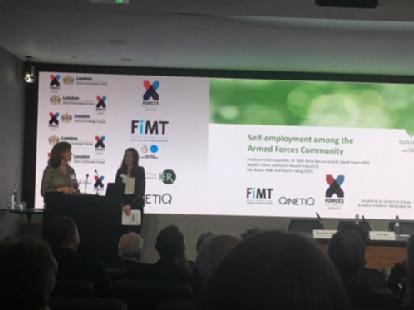IER News & blogs
Self-employment and older workers in the aftermath of the Covid-19 pandemic: seniorpreneurs, senior precarious or somewhere in between?
This book chapter examines self-employment among people aged 50 and over in the liberal market economies of Australia, New Zealand, the UK and the USA against the backdrop of the economic shock caused by the COVID-19 pandemic and in the context of long-standing efforts aimed at increasing levels of older workers’ labour force participation. It features in the new Research Handbook on Self-Employment and Public Policy
New report on the contribution of creative freelancers in the UK
 Based on research with 85 creative freelancers in Coventry, Northumberland and Waltham Forest, the report 'Mind the Understanding Gap: The Value of Creative Freelancers' provides detail on the contribution of creative freelancers to the economic, societal and place-based impacts of the creative industries.
Based on research with 85 creative freelancers in Coventry, Northumberland and Waltham Forest, the report 'Mind the Understanding Gap: The Value of Creative Freelancers' provides detail on the contribution of creative freelancers to the economic, societal and place-based impacts of the creative industries.
As the research, led by Coventry University, was undertaken in 2020 throughout the lockdowns, the report also identifies the impact of the pandemic on one of the most vulnerable groups of workers and sectors affected by Covid-19.
This report provides:
- the range of value generation for the economy and for society of creative freelancing,
- a typology of creative freelancers based on their generation of different types of value, and
- policy directions to support the full and sustainable contribution to economy, society and places of creative freelancing.
Do the self-employed have a future in the UK? Blog by Chris Warhurst
 For nearly two decades self-employment has been an important source of job growth for the UK economy. However the coronavirus crisis has highlighted how risky it is being self-employed. Current UK Government measures to support the self-employed might not be enough to stop a flight from self-employment once the crisis ends.
For nearly two decades self-employment has been an important source of job growth for the UK economy. However the coronavirus crisis has highlighted how risky it is being self-employed. Current UK Government measures to support the self-employed might not be enough to stop a flight from self-employment once the crisis ends.
Peter Elias leads workshop on employment statuses in response to Taylor Review

At the end of January 2019 Professor Peter Elias will lead a workshop on ‘Making employment statuses count: Statistical, legal and social perspectives on atypical workers in the digital age’.
The workshop will be held at the Royal Society of Arts in London and is funded and co-hosted by Deployed. It responds to the Taylor Review of Modern Working Practices call for clarification on the distinction between dependent contractors and the self-employed.
New research highlights challenges veterans face in becoming self-employed
 A new report, ‘Self-employment and the Armed Forces Community’, has revealed the barriers ex-Service personnel face in becoming self-employed after leaving the Armed Forces and calls for broader support from the MOD to help Service personnel transitioning out of the Forces and into self-employment. Research conducted by the IER, supported by defence technology company QinetiQ and X-Forces Enterprise (XFE) and funded by Forces in Mind Trust, was carried out to understand what more could be done to support ex-Service personnel to successfully move into self-employment. The report was launched on 10th October at the X-Forces Enterprise 5th Anniversary event at the London Stock Exchange.
A new report, ‘Self-employment and the Armed Forces Community’, has revealed the barriers ex-Service personnel face in becoming self-employed after leaving the Armed Forces and calls for broader support from the MOD to help Service personnel transitioning out of the Forces and into self-employment. Research conducted by the IER, supported by defence technology company QinetiQ and X-Forces Enterprise (XFE) and funded by Forces in Mind Trust, was carried out to understand what more could be done to support ex-Service personnel to successfully move into self-employment. The report was launched on 10th October at the X-Forces Enterprise 5th Anniversary event at the London Stock Exchange.
More info can be found here and a copy of the report, co-authored by IER's Professor Clare Lyonette, Dr Sally-Anne Barnes and Dr David Owen , Natalie Fisher and Karen Newell (both QinetiQ), Ren Kapur MBE and Martin Wing (both X-Forces Enterprise) can be viewed here.
